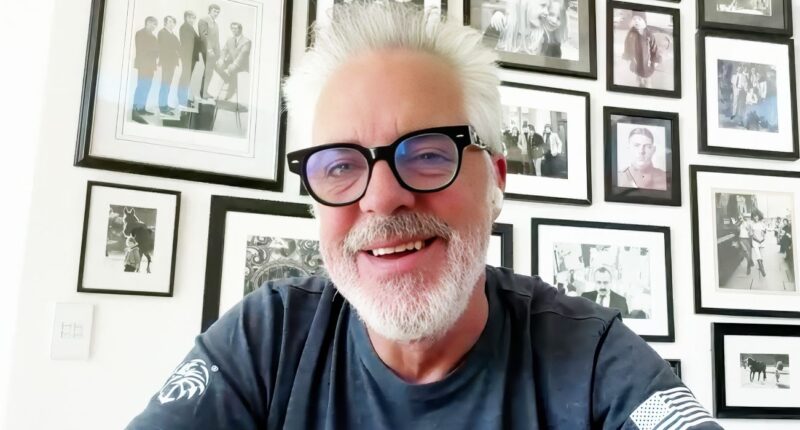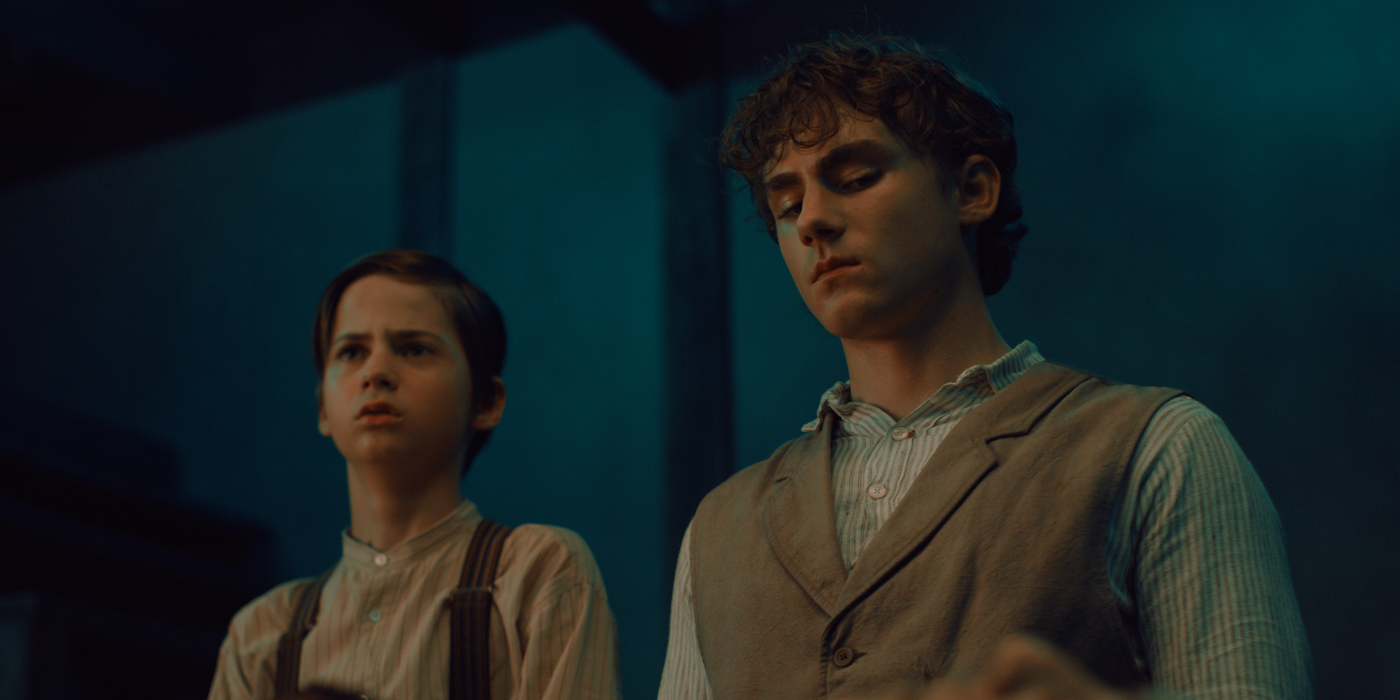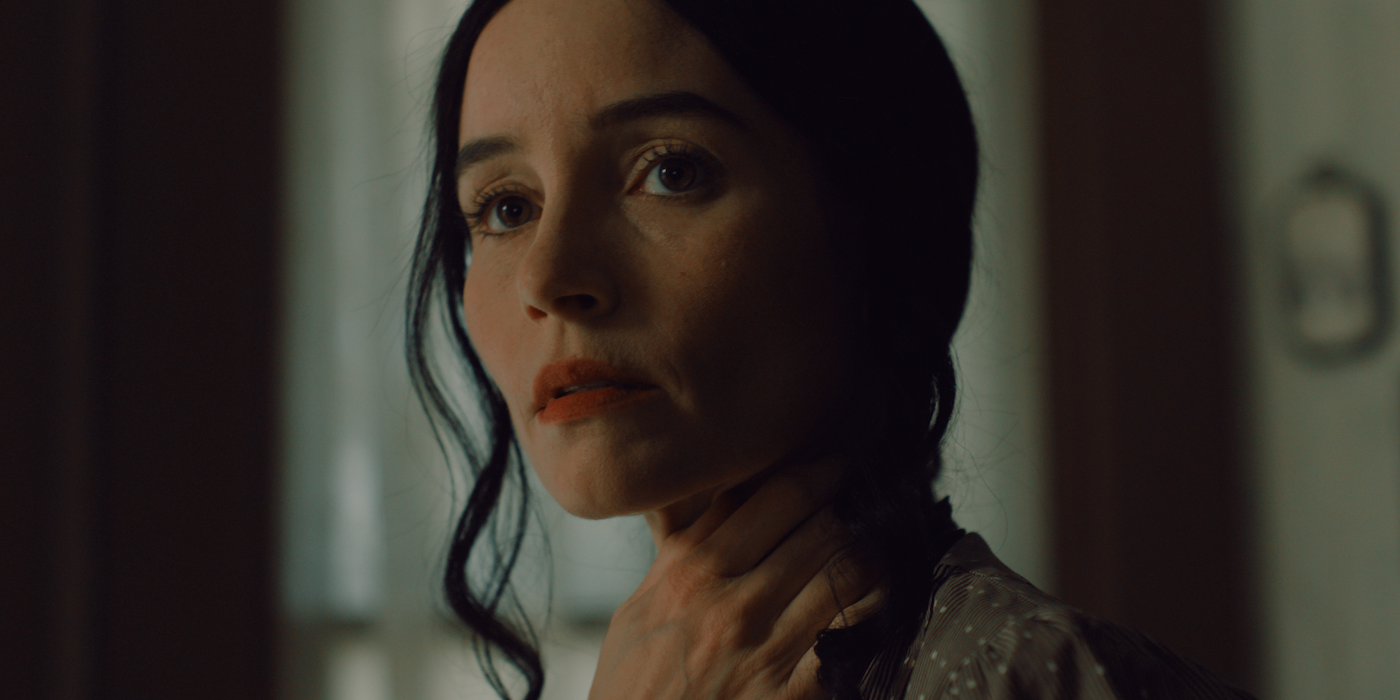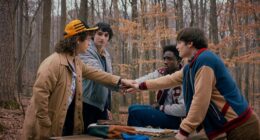Summary
- Collider’s Chris McPherson interviewed Titus Welliver ahead of Abraham’s Boys.
- From author Joe Hill, Abraham’s Boys puts a new spin on the Van Helsing story, with Welliver portraying a dark and complex version of the character.
- In this interview, Welliver discusses why he’s drawn to morally corrupted characters, the visual language of the film, portraying a character imbued with ambiguity, and teases his role in The Westies alongside J.K. Simmons.
While Titus Welliver may be best known for playing the hardened detective Harry Bosch in the Bosch franchise, in Abraham’s Boys: A Dracula Story he steps into darker territory as the famed historic monster hunter Abraham Van Helsing. The film, directed by Natasha Kermani (V/H/S/85) and adapted from one of the short stories in The Black Phone author Joe Hill’s 2005 collection 20th Century Ghosts, centers on Abraham’s two teenage sons.
At this stage in their father’s lives, Max and Rudy, portrayed by Brady Hepner and Judah Mackey, respectively, have started to question his methods and legacy as their family, and its history, begins to unravel. Kermani brings a tense, restrained vision to the film, subverting the home invasion genre by turning the home itself into a place of unresolved trauma and dread.
Collider’s Chris McPherson interviewed Welliver ahead of the film’s theatrical premiere to discuss his take on Van Helsing. Welliver reveals how he and Kermani shared visions for the visual language of the film early on, why he’s drawn to morally compromised characters such as Abraham, and teases what to expect from his role in his upcoming project with J.K. Simmons, The Westies.
Titus Welliver Brought His Own Ideas to ‘Abraham’s Boys’
“Bosch, vampire hunter.”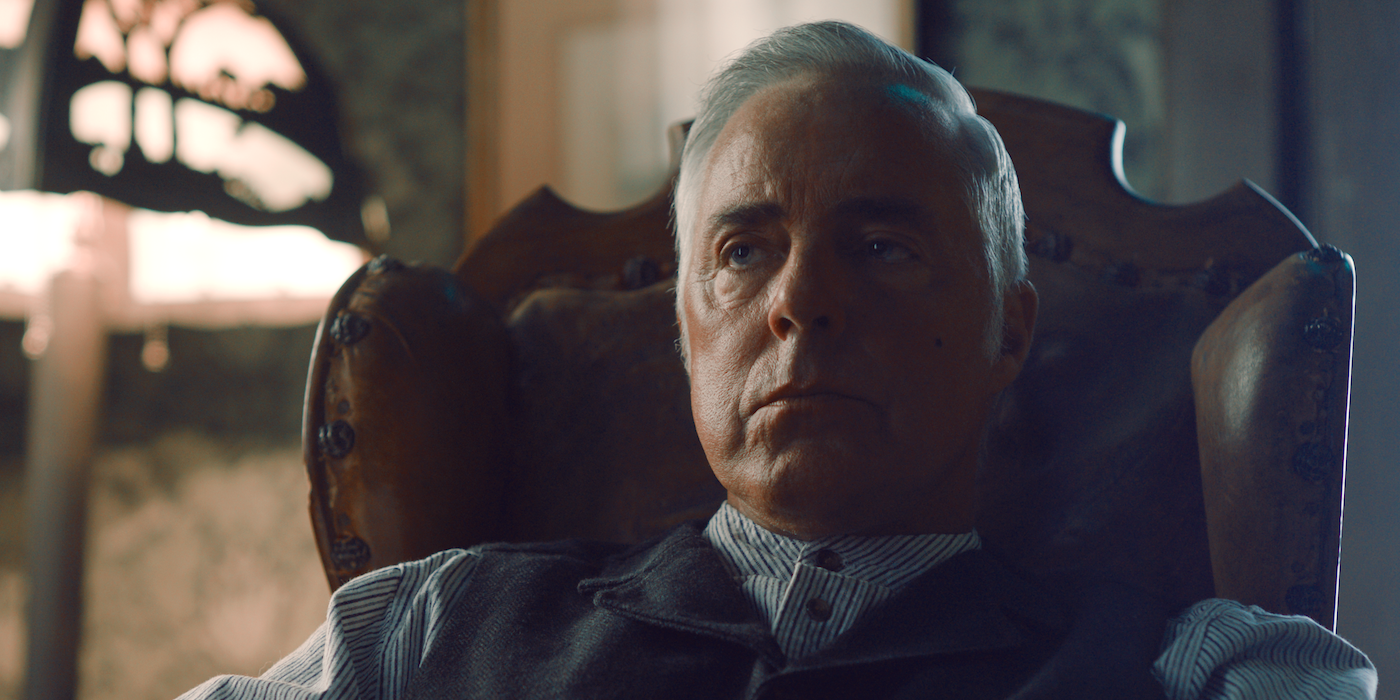
COLLIDER: Nice to see you again. How are you?
TITUS WELLIVER: Good to see you. I love me some Collider, man. You guys have been incredibly good to me. I always say, “If you need to know something, check out Collider.” You guys have the vault of information. The inside baseball.
We try our best, I’ll say that much. But it helps when we feel passionate about something, like anything you’re in. That really helps.
WELLIVER: Well, cheers. I thank you for that, man.
So I’ll start off by saying this was the strangest episode of Bosch I’ve ever watched.
WELLIVER: Bosch, vampire hunter. Can you imagine?
Congratulations on the movie. I really enjoyed it.
WELLIVER: Thank you.
I really loved the atmosphere. I loved the vibe of it. Freaked me out a little bit in a good way, which I think is the purpose. Van Helsing is usually portrayed as a heroic character, and this version is a lot darker than that. Is that the kind of thing that drew you to take it on? When did you first encounter the short story?
WELLIVER: Well, I didn’t read the story until I read the script, Natasha’s adaptation, first, which I was kind of blown away by. That was not a hard decision to make. I felt like the characters were all really incredibly well-realized and compelling. Then I read the short story by Joe Hill, and they mesh really perfectly. When Natasha started to talk to me, I had very, very specific ideas, and I think it’s just because I’ve been doing this to the point where, when I read things, I think, “Well, if I was directing this, what would I be using as my template visually?” What was odd was, in our conversation, I started throwing out films as a kind of template visually, and then Natasha sent me her lookbook, and they were all the films that I had been talking about. So, we were so synchronized in that moment that it was laughable.
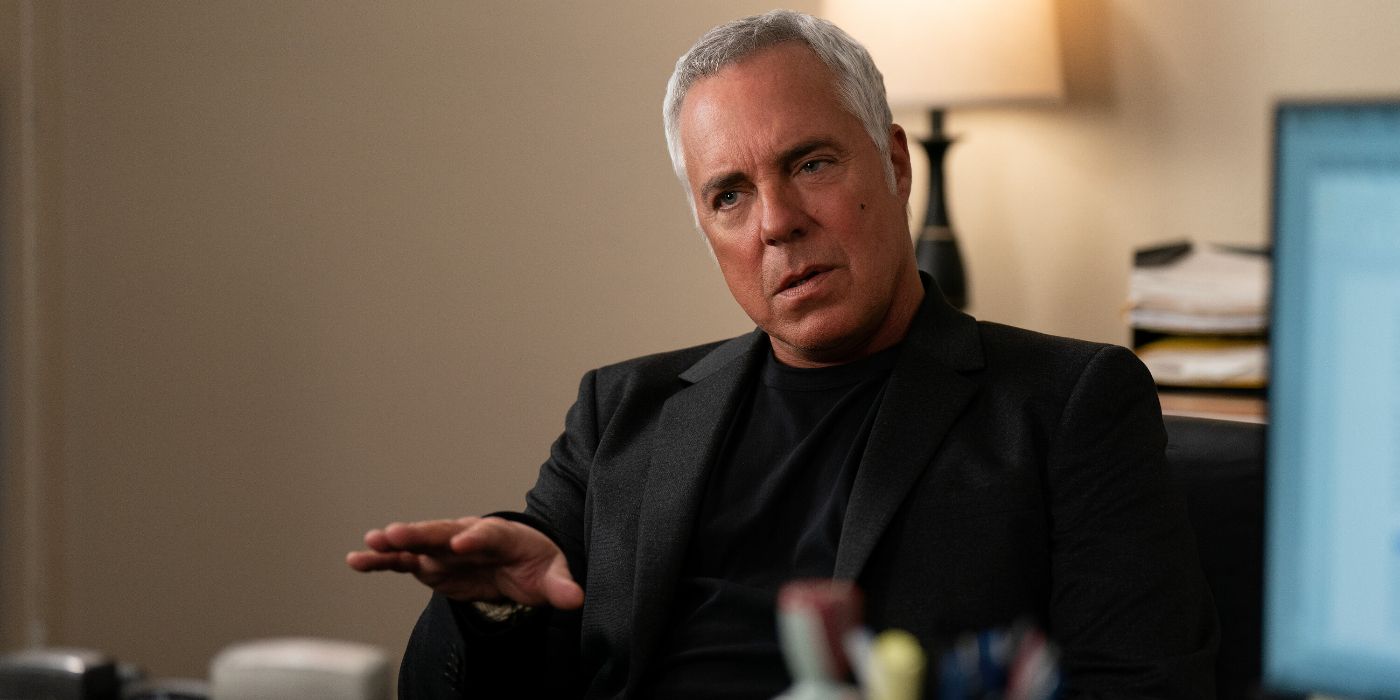
Related
‘Bosch’ Spin-Off Creator Clarifies Titus Welliver’s Role After ‘Legacy’ Cancellation
Will it only be a cameo?
That’s also the beauty of this film, because that element has not been necessarily used before. It’s sort of a night of terror and day of weird. Here you have this beautiful backdrop in Simi Valley, these rolling hills with the fields blowing, and it’s a stunningly beautiful place. Then here you have this almost like a castle, perched on the top of the hill, but it’s almost sort of medieval and militaristic in where it’s located. Obviously, if you were going to build a house back in those days, that would be a great place to put your house, because you get 360-degree views, but once you understand that it’s Van Helsing, you realize that this is somewhat probably by design to be able to see what’s coming and going all the time. So the house itself becomes a character in the film, because that which occurs inside the house, where it is, that’s the safe haven. The irony of that is obvious. There’s some kind of malevolence that exists in the house. It’s less what’s outside and more what’s inside, and you just don’t really know.
I don’t know if you recall, but there’s a great film that Roman Polanski did, The Tenant, and this and the take on Van Helsing reminded me of that. You’re not sure if this is just him and his continuation, and the kind of dog it pursued to destroy darkness, this dark entity from the earth, or if this is a descent into paranoia and madness. A little bit of a guy who’s done too much, seen too much. He’s pretty straight and direct. He’s unflappable. It’s not a Boris Karloff thing where he’s going, “Boogie boogie boogie.” You know, he’s been there, done that. And the boys, they’re really the audience’s point of view to all of this, and so both Brady and Judah did a marvelous job. Anyone who’s seen this film is going, “What the hell is going on?” Because there’s the surface stuff, and then there’s the subtextual things, and that’s all played through the narrative of the boys.
‘Abraham’s Boys’ Has a Western Vibe With a Gothic Heart
“There’s a level of sophistication with this film.”
It’s interesting what you about how Van Helsing is preparing for something to invade. There’s an evil coming when, in actual fact, the real danger in the threat is inside. The film felt almost like a Western in that respect, with the family waiting for home invaders. Was it really important to nail the tone of that? Because it’s a very specific niche, that particular description. You need to make sure it’s right, otherwise it can come off as trite. Maybe trying too hard.
WELLIVER: Well, that’s the thing about Natasha. She’s an inordinately very, very, very smart director and writer, and human being. Very, very bright. So, there’s no trophy bits in this. As I said before, the nature and the placement of the house, and the house being a sort of character of its own, there is an underlying feeling. Because I agree with you, it feels like a smaller John Ford Western, right? The anticipation. Something is coming. Something is definitely coming.
If you think back to the world at that time, we were sort of past the point of the invaders, and yet there is still that. So, it almost kind of does. It harkens back to the old Westerns of circling the wagons as the Indian bands were attacking. But this is a malevolent and powerful and sometimes invisible force that’s coming, and so that all has to come through visually. That is Natasha and the cinematographer coming together to really create this world and then allow us to live in it. There’s a level of sophistication with this film. There’s not a lot of gore. It’s very spare in that regard. It’s not a slasher. It’s not a hacker. But there are many moments in the film that are really, really deeply unnerving visually, and some of them happen like that. It’s not necessarily jump scare stuff. It’s just a little bit of, “Oof.”
It makes you double-take what you’re seeing.
WELLIVER: “Did I just see what I thought I saw?” And that’s smart filmmaking. That’s just really, really smart filmmaking.
Absolutely.
Living by Conviction or Losing Grip on Reality?
“You don’t play the paranoia or a descent into madness.”
One of the things I had to bring up with regards to Van Helsing as a character is that obviously we see the descent into paranoia and almost not believing that his mission is accomplished. We know it’s nearly two decades since the end of Dracula, but yet he still can’t quite settle. It makes you wonder, at a certain point, when you remove the creatures from Van Helsing’s past, it’s almost the case of, “Has he just turned into a serial killer because he doesn’t know what to believe anymore?”
WELLIVER: Right, right. That’s the trick. That’s the balance that we had to find. I think it speaks directly to what you’re saying, right? Where is that balance? Because we all know the backstory of Van Helsing, and he speaks enough about it, but does not go into some massive monologue. In fact, when I tell Brady that this can cross, “I fear that it’s followed us here,” it’s not oogie-boogie. It’s very it’s direct, and I think that’s what makes that work. I made a very conscious effort to never comment on those things because it is simply reality, and so the audience goes along for the ride. They go, “This is Van Helsing. He knows what he’s doing.” But everything that’s in the orbit. There’s Mina in the descent of her health, and the boys. I think it’s kind of like having a crazy, raging, alcoholic parent who has two emotions — silence and rage — and the uneasiness, which is really, really well portrayed by Brady and Judah. That uncertainty. That feeling of, “Well, I feel safe, but now he’s telling me that we’re not safe. What’s going on?” They’re not necessarily seeing any kind of evidence there to sort of bolster what he’s saying.
That was something I really liked about the way the film played out. We as the audience know that Van Helsing has dealt with these creatures. We know that he’s had this history, and we know that the threat has been out there. I liked that there was the uncertainty, and the comments on faith from Van Helsing himself, almost as if his sons weren’t sure if they actually believed their father’s stories were true. Even by the end, they’re probably still not convinced, but it’s an interesting position to put them in where they believe they’re doing the righteous thing. Their father knows he was doing the righteous thing, and we, as the audience, are split between them. I thought that was a really clever bit of filmmaking, because we’re put in the position of knowing more than the main characters do the whole way through the film, and it was interesting to see how they played that off.
WELLIVER: Yeah, they did it. Once again, that’s good actors, and a very, very strong director who knows how to guide. Really, our job, as it always is, is to service the story, and it was a marvelous script, so it wasn’t a lot of heavy lifting in that. We didn’t have to muck about with it, and it didn’t have to lean into tons of blood and gore to make the audience be titillated and/or uncomfortable. The idea with this was to make the audience feel uncomfortable and uncertain as this whole thing unravels. I feel like the reveal of so much, when the things start to happen, is kind of startling, but once again, it’s like being on a three-legged chair. You have to sit in it at a certain angle, or it’s going to fall on the floor, and I think that’s what Natasha really achieved.
Do you enjoy taking on these villainous parts more than anything else, or do you find that there’s a joy and a pleasure in any role that you take on? I just think that with villains, there’s always that difficulty and the challenge of making them empathetic.
WELLIVER: Yeah, well, this character on the page was really intriguing to me, because villains are a lot of fun to play for a myriad of reasons, because they operate outside of the rules that we all adhere to. The thing about Van Helsing, particularly in this iteration, is that there’s a complexity to that character, but he doesn’t show you too much, so there’s an odd inner peace and resolution that’s within that character that allows him to be very still. I always find that with any character, and in villains, you can never, despite their actions, judge a character when you’re going to play it, because it’s going to inform your performance. So, you don’t play the paranoia or a descent into madness. You play that this is a guy who’s absolutely living by his convictions and has 100% knowledge that that which he is doing is in the service of right.
Natasha gave me a lot of room to create that character, because we’ve seen many iterations of Van Helsing, and I thought that Joe Hill’s story was a different take on the character. Natasha really serviced that in her adaptation and kept that integrity. So, it was a marvelous character to play. I really thoroughly enjoyed it. It was a departure. Van Helsing was sort of an opportunity, and I haven’t done a lot of things.
Although I hate to say it, you can’t really place this necessarily in the horror genre. It’s an art film, you know? It’s a Western, and it’s got the Gothic horror undertones, but I think it’s a thinking person’s film, rather than just being, “Here it is, be scared, jump out of your seat, scream.” It’s a much more seductive, quasi-hypnotic experience. You get pulled in, and that, to me, is the mark of a very, very smart director. Natasha’s made other films that were really, really good. I feel like this film is the springboard for her to go to the next level. And, I told her, “You call me. Whenever you’re doing something, call me up,” because I thoroughly enjoyed working with her. I think that certainly the best is yet to come, but this is a hell of a springboard film for her. So, I’m very, very proud of the film and proud to be a part of it and this whole cast.

Related
Joe Hill’s ‘Dracula’ Spinoff ‘Abraham’s Boys’ Lands Director Natasha Kermani
Women directing vampire movies is definitely the mood right now.
Preparing for ‘The Westies’ With JK Simmons
“He’s no Harry Bosch.”
I’ll just wrap with one more quick one. We’ve seen a few announcements for your next couple of roles coming up. Is there anything you can tell us about the MGM series, The Westies, with J.K. Simmons?
WELLIVER: It takes place around 1981. J.K. plays the leader of the Irish gang in Hell’s Kitchen in New York, The Westies, and I’m from the same neighborhood. We came up together, but I’m a police officer. He’s no Harry Bosch, but believe me, this guy is a Vietnam War veteran. He’s a B cop. He still walks the streets, but he’s corrupt. His moral compass has been completely compromised, and I’m thrilled at the prospect of working with J.K., who I’ve been a massive fan of for obvious reasons. He’s an incredible actor. And Chris Broncato and Michael Paynes are longtime friends of mine. We’ve been wanting to work together, so I think it’s going to be really good. The scripts are phenomenal. The character is the absolute polar opposite. Somebody said to me, “Do you really want to do a cop?” Well, if I could let you read the script, you would realize why.
This is a very, very complex and deeply nuanced character, in the same way that Bosch was, but this is a very, very dark world, and it’s all about the relationship between… They were building the convention center, the Javits Center, which meant that there were all sorts of union things, and there was a lot of money to be made, illegal millions to be made, and the Gambino crime family, at that time led by Paul Costolano and eventually John Gotti. So, it’s in that kind of tumultuous time, and the fragility of the relationship between the Irish and the Italian mob. The Irish mob is outnumbered 100 to one, but they were tough, and they were ruthless. So, it’s going to be really, really good. I’m excited. I start working on that in about a week.
Oh, great. I look forward to seeing that one. That shot to the top of my list as soon as I read about it. I can’t wait to see it.
WELLIVER: I think you’ll dig it. It’s definitely right up your strasse. It’s very, very well written, and has really interesting characters. It doesn’t matter if you’re from New York or were in New York at that time period. It was a very kind of chaotic and crazy time in New York anyway, and so we’ll get to capture that. So it’ll be a lot of fun, but I’m really excited to get to it, to get it done so we can get it out there so you can see it.
Abraham’s Boys is now running for a limited theatrical release.

Abraham’s Boys
- Release Date
-
July 11, 2025
- Runtime
-
89 minutes
- Director
-
Natasha Kermani
- Writers
-
Joe Hill
Get Tickets
